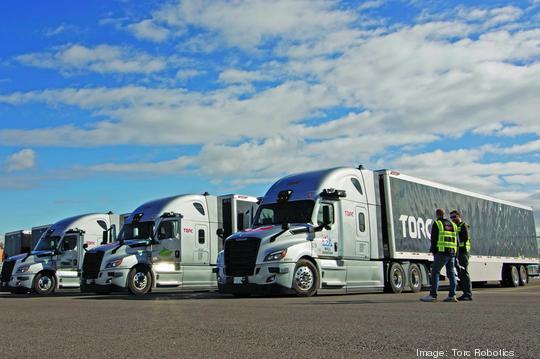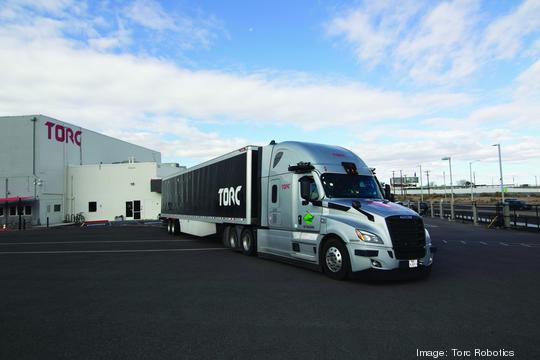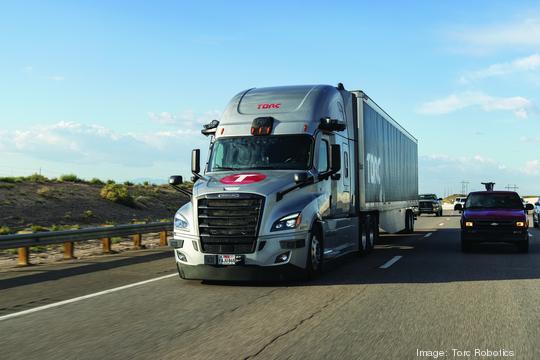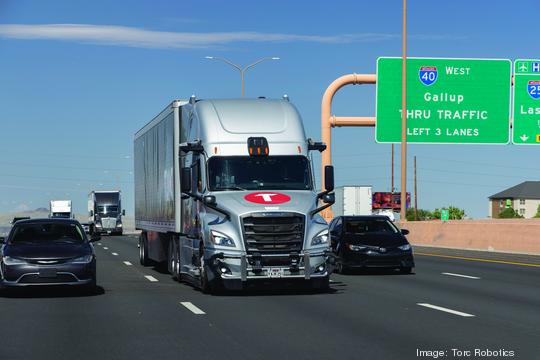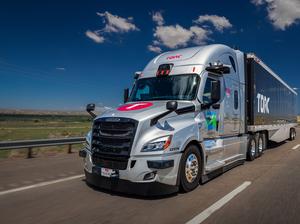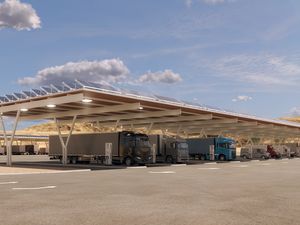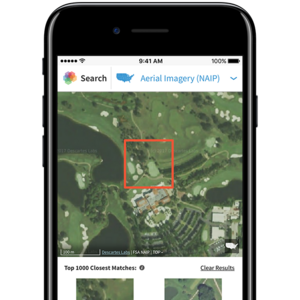Every company needs a proving ground for its technology.
Aerospace companies like Virgin Galactic and SpinLaunch come to New Mexico for test launches because of the state's clear weather and open space. Robotics, biochemical and pharmaceutical companies benefit from research conducted at the state's Sandia National Laboratories and Los Alamos National Laboratory. Government contractors vie for deals through the Air Force Research Laboratory at the state's Kirtland Air Force Base.
But what can Albuquerque, specifically, offer a company that's testing technology for fully autonomous, self-driving tractor-trailers?
According to its CEO: "Everything that you need."
The location
"You have everything that it takes," said Peter Vaughan Schmidt, Ph.D., who is the CEO of Torc Robotics Inc. "If you can do Albuquerque, you can do anything."
That's thanks to a number of factors that make the Duke City uniquely well-suited for piloting autonomous driving technology. A complex interstate interchange, strong crosswinds, dense urban highway traffic and uphill and downhill stretches all make for ideal testing conditions.
"It's like for robot taxis that drive in San Francisco because it's the hardest thing to do to test your technology," said Schmidt, who assumed the role of CEO in October. "For us with trucks, I think Albuquerque is a perfect spot."
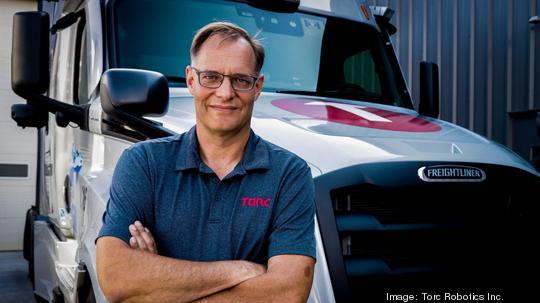
Headquartered in Blacksburg, Virginia, Torc Robotics started testing its self-driving technology in Albuquerque in the fall of 2020. That's when the company opened its 40,000-square-foot Albuquerque Test Center located at 1200 Lomas Blvd. NE, just east of Interstate 25.
The company hosted a media day on Nov. 16 at the Test Center. Four members of different media organizations from across the country — including Albuquerque Business First — toured the facility and rode in some of Torc's autonomous tractor-trailers. Torc employees based in Virginia and elsewheretraveled to Albuquerque to lead sessions on the company's technology, strategy and how the trucking industry may evolve.
Torc is an independent subsidiary of Daimler Truck, a global trucking company that's headquartered in Germany. Daimler, which has its North American office in Portland, Oregon, manufactures the tractor-trailers that Torc uses to test its autonomous driving tech.
The Albuquerque Test Center is where Torc runs a lot of its operations. These include everything from equipment maintenance to software implementation to driver training. But on-road testing is the most public-facing of those local activities.
The fuel
While driving along Interstate 25 or Interstate 40 around Albuquerque, you've probably noticed a tractor-trailer with Torc's logo on the side. What you're witnessing is an on-road test of the company's autonomous driving system.
This testing process is rigorous. A mission control center at Torc's Albuquerque facility is constantly monitoring the tractor-trailers while they're on the road. The company collects hundreds of data points about how the self-driving system responds to different scenarios, like merging onto interstates or being cut off by a hasty car.
Read More: Torc's tech aims to be 'better than the best human driver'
Highly skilled truck drivers and safety conductors ride inside the tractor-trailers while they're on the road to ensure the process is completely safe. If something is wrong at any point on a test run, the driver can take control.
Torc brings some of the "best truck drivers on the planet" to Albuquerque, said Andrew Culhane, Torc's chief strategy officer. The way these drivers and other workers at the Test Center have "jumped" on the autonomous technology "is great," he added. It's another reason that Torc has found Albuquerque to be an ideal testing location — being able to develop "the culture of the workforce" here, Culhane said.
The Test Center employs over 100 people in a mix of positions, from test drivers to engineers to operation control managers. And, Culhane said, there's a "pretty steady stream" of employees that come to the facility for shorter periods to work on the technology.
"I think most of the local hotels have gotten to know our staff pretty well," Culhane said.
This overseas talent and employee growth in Albuquerque matches other, more recent Torc expansions. This year, the company opened an engineering office in Austin, Texas, and a technology and development center in Stuttgart, Germany. Torc Europe GmbH, an independent entity and full subsidiary of Torc Robotics, runs out of the Stuttgart center.
And this fall, Torc announced a partnership with Schneider (NYSE: SNDR). The Green Bay, Wisconsin-based logistics company will provide freight loads for Torc's testing operations. Penske Truck Leasing also formed a partnership with Torc this past spring to serve as the truck maintenance service provider for the robotics company.
Schneider and Penske are both a part of the Torc Autonomous Advisory Council, which the company launched in March to help guide its commercialization efforts.
The destination
Commercializing its autonomous driving system is what all the testing, workforce expansion and industry partnerships are for, Culhane said. It's moving toward a future where the self-driving system is fully autonomous. But there are still many skilled test drivers and lots of on-road testing required before the company gets to that point, Schmidt, Torc's CEO, said.
At this point, federal guidelines for the operation of autonomous vehicles don't exist, according to Laura Lawton, Torc's director of public relations. Rather, each state develops its own guidelines.
Once federal guidelines exist, the National Highway Traffic Safety Administration, the U.S. Department of Transportation and the Federal Motor Carrier Safety Administration will be involved in regulating use of autonomous vehicles, she said.
Torc ultimately wants to apply its autonomous system to long-haul trucking routes, which would reduce the need for truck drivers to be out on the road for months at a time. It's currently testing the trucks on routes between Albuquerque and destinations as far away as Oklahoma City to mimic those typical long-haul trips.
This long-haul focus is what's called a "hub-to-hub model," said Walter Grigg, Torc's program manager of product strategy. Instead of engineering the autonomous driving system to navigate complicated city streets around shipping centers where goods are loaded and unloaded, Torc is engineering its system to drive goods between logistics hubs that are closer to interstates.
Human drivers would still drive trailers from shipping centers to logistics hubs, Grigg said.
"[Truck drivers] bring [the trailers] to a big parking lot that has infrastructure that supports these [autonomous driving] systems and transfer it," Grigg said. "They drop that trailer off and that is where it then connects to the autonomous truck."
The autonomous system controls the "middle mile" of the trip, Grigg said, traveling long distances between hubs in large market areas primarily via highways or interstates.
"If you can get the load there safely, everything else is just logistics," Grigg added.
The model fits into a growing trend in the trucking industry that's seeing a shortage of truck drivers and steady growth of advanced driver assistance systems like Torc's.
But even with a burgeoning market, Torc isn't rushing to roll out its technology. The company hasn't set a definite date on when it expects to take the autonomous driving technology to market.
That's because Torc has a "safety bar" for the self-driving technology to meet, Schmidt said.
It's testing its autonomous trucks in a multitude of different scenarios and "edge-cases," like concrete bricks falling in front of the trucks or aggressive cars swerving in and out of lanes, Torc's Vice President of System Design and Safety Engineering Dushyant Wadivkar said. Torc is combining simulations with data from the on-road tests to know when the system is fully safe.
Schmidt said how the autonomous trucks respond to these simulations, and how they handle continuous on-road testing, will tell the company when the technology is ready.
"We have lead indicators that help us find out if we're there or if we have more work to do," he said. "As soon as we hit this bar we are ready to hit the market. By the end of the decade, I think autonomous trucks will be a reality on our roads."
